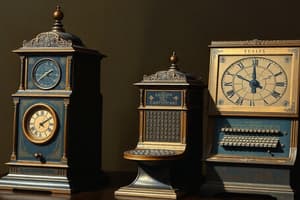Podcast
Questions and Answers
Who invented the first large-scale automatic general-purpose mechanical analog computer in 1931?
Who invented the first large-scale automatic general-purpose mechanical analog computer in 1931?
- John Vincent Atanasoff
- Vannevar Bush (correct)
- Konrad Zuse
- Alan Turing
Which individual presented the principle of a universal machine in 1936, later known as the Turing machine?
Which individual presented the principle of a universal machine in 1936, later known as the Turing machine?
- Douglas Engelbart
- Vannevar Bush
- Alan Turing (correct)
- John Vincent Atanasoff
Who completed the world's first digital computer, the Z3, in 1939?
Who completed the world's first digital computer, the Z3, in 1939?
- Alan Turing
- John Vincent Atanasoff
- Konrad Zuse (correct)
- Vannevar Bush
In which year did Jack Kilby and Robert Noyce invent the integrated circuit, revolutionizing computer technology?
In which year did Jack Kilby and Robert Noyce invent the integrated circuit, revolutionizing computer technology?
Who revealed a prototype of the modern computer in 1968, including a mouse and a graphical user interface?
Who revealed a prototype of the modern computer in 1968, including a mouse and a graphical user interface?
Flashcards are hidden until you start studying
Study Notes
The History of Computing: From Ancient Astronomy to Modern Computing
The history of computing can be traced back to ancient astronomers who developed ways to predict the motion of celestial bodies. The Greeks were among the first to calculate the shape and size of Earth. Later, the invention of the abacus in China and the Arithmometer in Europe laid the foundation for mechanical calculators that could perform arithmetic operations.
Early Computing Devices
One of the earliest known calculating devices is the abacus, which dates back at least to 1100 BCE. The abacus consists of a rectangular frame with thin parallel rods strung with beads. It allowed a wide range of numbers to be represented by just a few beads and was instrumental in the development of the Hindu-Arabic number system.
Another early device was the Jacquard loom, invented in 1804-05 by a French weaver, Joseph-Marie Jacquard. The loom was a textile-weaving machine that could also be considered the first practical information-processing device. It used a series of cards with holes to control the motion of rods, enabling the automated weaving of complex patterns. The Jacquard loom demonstrated the potential for controlling a machine based on the sequence of operations, which would later influence the development of computer programming.
Mechanical and Analog Computers
In the early 20th century, mechanical and analog computers were developed to perform mathematical calculations. One of the pioneers in this field was Vannevar Bush, who invented the Differential Analyzer in 1931, the first large-scale automatic general-purpose mechanical analog computer. Another significant figure was Alan Turing, who in 1936 presented the principle of a universal machine, later known as the Turing machine, which could compute anything that is computable.
Electronic Computers
The development of electronic computers began in the late 1930s and early 1940s. John Vincent Atanasoff, a professor of physics and mathematics at Iowa State University, submitted a grant proposal in 1937 to build the first electric-only computer, without using gears, cams, belts, or shafts. Konrad Zuse completed the Z3, the world's first digital computer, in 1939, although it was destroyed during a bombing raid on Berlin during World War II.
After the war, computers became more widespread, with the development of the IBM 701 EDPM (Electronic Digital Data Processing Machine) in 1949 and the first version of IBM's FORTRAN programming language in 1954. In 1958, Jack Kilby and Robert Noyce invented the integrated circuit, or microchip, which revolutionized computer technology and paved the way for modern computers.
Personal and Home Computing
In the late 1960s, Douglas Engelbart revealed a prototype of the modern computer at the Fall Joint Computer Conference in 1968, including a mouse and a graphical user interface (GUI). In 1969, Ken Thompson, Dennis Ritchie, and a group of developers at Bell Labs produced UNIX, an operating system that made large-scale networking of diverse computing systems possible, leading to the development of the internet.
Home Computing and Gaming
The 1970s saw the introduction of home computers like the Commodore Personal Electronic Transactor (PET) and the Magnavox Odyssey, the world's first home game console. In 1977, Atari released Pong, the world's first commercially successful video game.
Modern Developments
Since then, computer technology has continued to evolve rapidly, with the development of Ethernet for connecting multiple computers and other hardware by Robert Metcalfe in 1973. The 1980s and 1990s saw the rise of personal computers and the spread of computer technology to nearly every aspect of modern life.
In conclusion, the history of computing spans thousands of years, starting with the abacus and the Arithmometer, progressing through mechanical and analog computers, and culminating in the development of electronic, personal, and home computers. Today, computers are an integral part of our daily lives, and researchers continue to explore new ways to harness their power, including advancements in artificial intelligence, quantum computing, and biologically inspired computing.
Studying That Suits You
Use AI to generate personalized quizzes and flashcards to suit your learning preferences.




